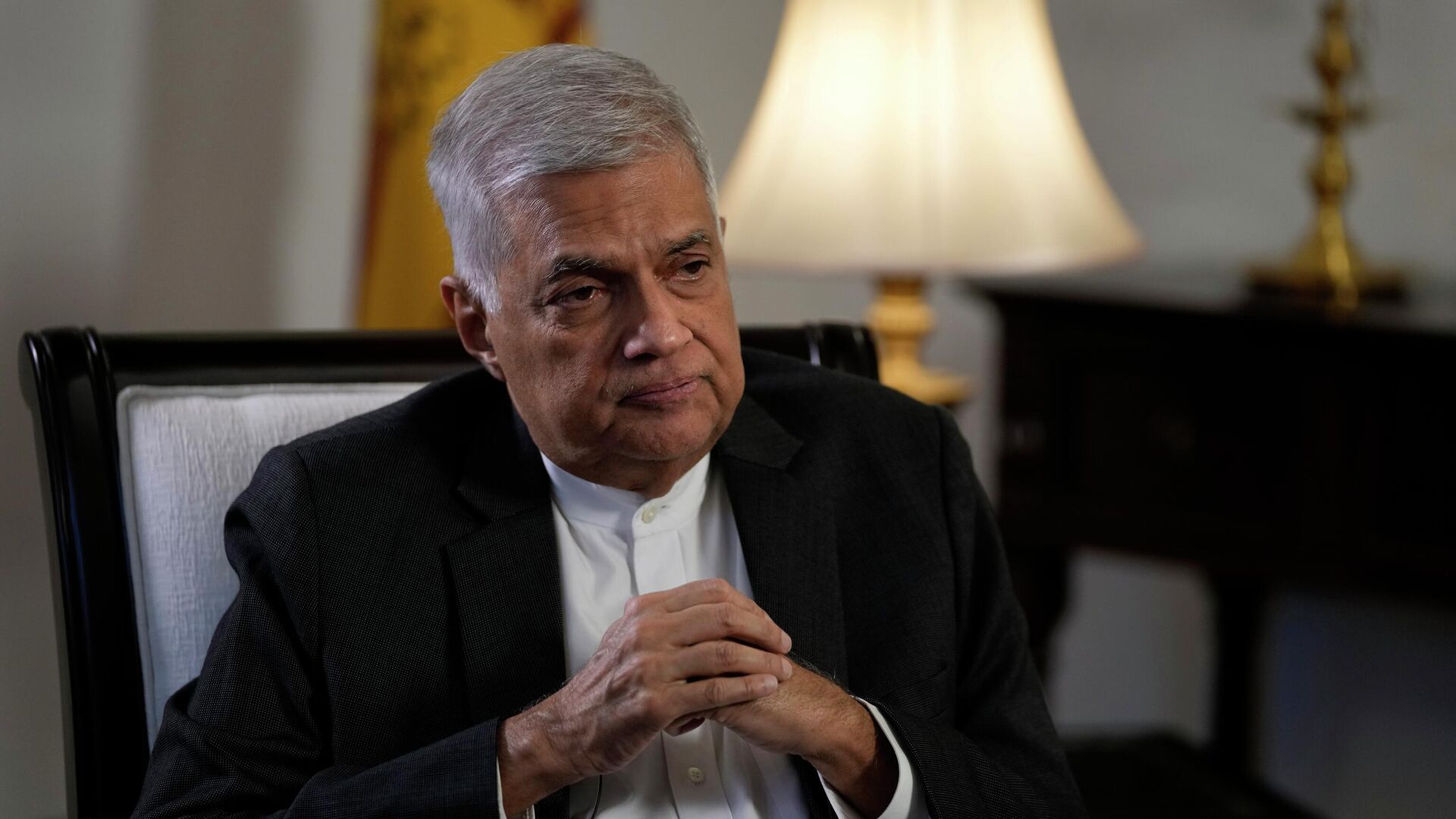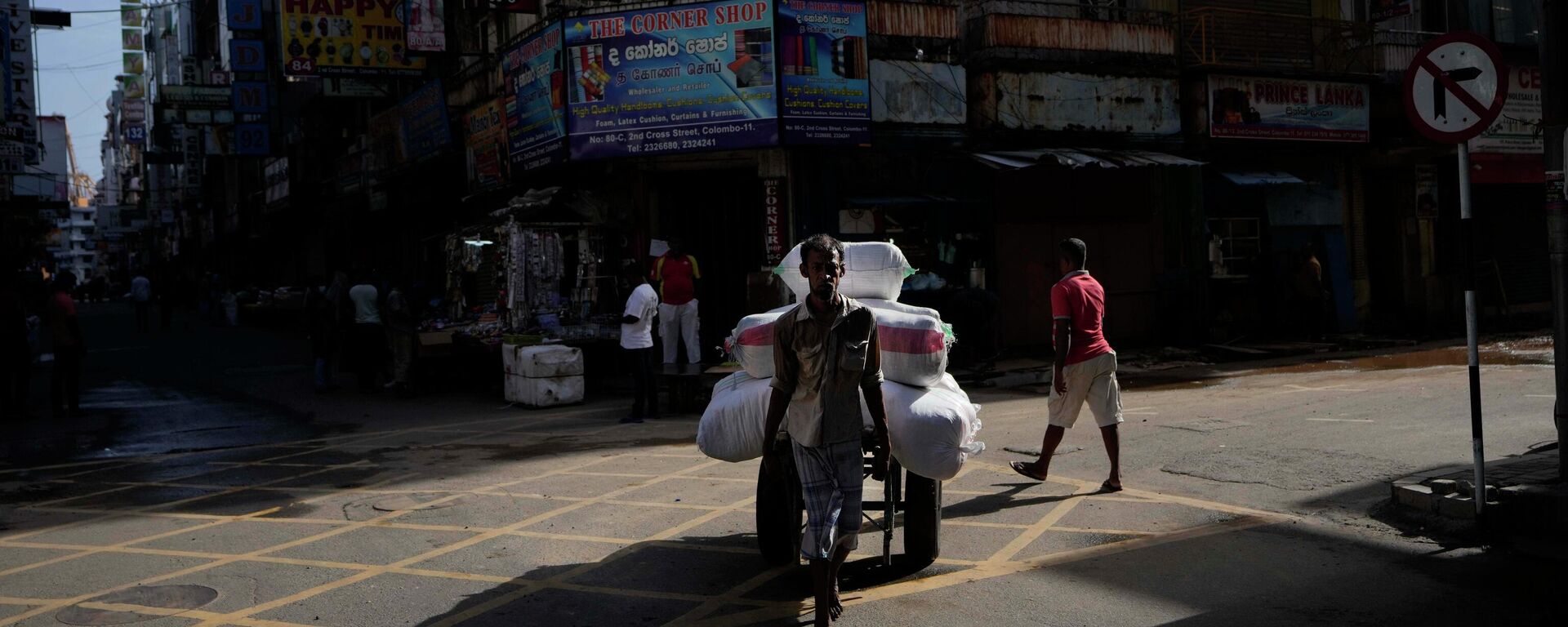https://sputnikglobe.com/20220705/sri-lankan-pm-offers-resignation-challenging-opposition-to-revive-bankrupt-economy-in-six-months-1096969066.html
Sri Lankan PM Offers Resignation, Challenging Opposition to Revive 'Bankrupt' Economy in Six Months
Sri Lankan PM Offers Resignation, Challenging Opposition to Revive 'Bankrupt' Economy in Six Months
Sputnik International
The country's leader acknowledged the difficulties Sri Lanka faces while negotiating for loans as a “bankrupt country”. The foreign exchange crisis led to... 05.07.2022, Sputnik International
2022-07-05T11:46+0000
2022-07-05T11:46+0000
2022-12-08T16:17+0000
china
us
imf loan
loan
foreign exchange
sri lanka
debt
ranil wickremesinghe
gotabaya rajapaksa
sputnik
https://cdn1.img.sputnikglobe.com/img/07e6/06/16/1096553987_0:160:3073:1888_1920x0_80_0_0_1d3f543e536c32dc61dd7dcb9ac3d034.jpg
Sri Lanka's Prime Minister Ranil Wickremesinghe on Tuesday engaged in a heated exchange with opposition leader Sajith Premadasa as the latter accused the government of being “incapable” of reviving the island's “collapsed economy”.Wickremesinghe, appointed as prime minister in May after his predecessor Mahinda Rajapaksa resigned in the wake of violent protests, also offered to step down in response to the opposition’s claim that they could revive the economy in six months.The prime minister underlined that the opposition still has not explained how Sri Lanka’s economy can be revived.Critics slammed the government for its delay in securing loans from any country or international institution for fuel and other essential commodities. The government responded by saying that since the country was bankrupt, delays were inevitable.“Because our country is in a state of bankruptcy, we have to submit a plan on our debt sustainability to [lenders] separately. Only when they are satisfied with that plan can we reach an agreement at the staff level,” the prime minister explained.On 1 July, the 10-day talks with the IMF concluded in Colombo on a positive note, with the institution describing the discussions as “positive and productive.”Sri Lanka will now submit a debt sustainability report by August, indicating more delay in the conclusion of the staff-level agreement as claimed by the prime minister in May. Colombo has also planned to organize a donor-aid conference by bringing together the partner countries, such as India, China, and Japan.Prime Minister admitted that the 22 million people living on the island nation are facing fuel and food crises, and the situation could remain tense until 2023. On Monday, energy minister Kanchana Wijesekera said the country’s fuel stock will run out in a few days, forcing nationwide school closures and prolonged power cuts.According to central bank statistics, Sri Lanka’s present economic growth rate is between negative-four and negative-five. According to IMF statistics, however, it is between negative-six and negative-seven.Sri Lanka has to pay a debt of $3.4Bln between June and December this year and $5.8Bln in 2023. According to the government, the island nation will have to pay $19.4Bln in debt between 2024 and 2027.Once a rapidly developing economy, Sri Lanka fell into bankruptcy because of unviable foreign-aided infrastructure projects and the COVID-induced loss of tourism, an industry on which the economy strongly relies.Want to know more? Check out our Koo & Telegram accounts!Koo: https://www.kooapp.com/profile/sputniknewsSputnik India: https://t.me/sputniknewsindia
https://sputnikglobe.com/20220701/implementing-imf-reforms-in-sri-lanka-will-be-painful-but-they-are-essential-says-policy-analyst-1096861116.html
china
sri lanka
Sputnik International
feedback@sputniknews.com
+74956456601
MIA „Rosiya Segodnya“
2022
Rishikesh Kumar
https://cdn1.img.sputnikglobe.com/img/07e4/08/04/1080055820_0:0:388:389_100x100_80_0_0_40018ee210946d65d49ffba4f4c008e1.jpg
Rishikesh Kumar
https://cdn1.img.sputnikglobe.com/img/07e4/08/04/1080055820_0:0:388:389_100x100_80_0_0_40018ee210946d65d49ffba4f4c008e1.jpg
News
en_EN
Sputnik International
feedback@sputniknews.com
+74956456601
MIA „Rosiya Segodnya“
Sputnik International
feedback@sputniknews.com
+74956456601
MIA „Rosiya Segodnya“
Rishikesh Kumar
https://cdn1.img.sputnikglobe.com/img/07e4/08/04/1080055820_0:0:388:389_100x100_80_0_0_40018ee210946d65d49ffba4f4c008e1.jpg
china, us, imf loan, loan, foreign exchange, sri lanka, debt, ranil wickremesinghe, gotabaya rajapaksa, sputnik, economic crisis
china, us, imf loan, loan, foreign exchange, sri lanka, debt, ranil wickremesinghe, gotabaya rajapaksa, sputnik, economic crisis
Sri Lankan PM Offers Resignation, Challenging Opposition to Revive 'Bankrupt' Economy in Six Months
11:46 GMT 05.07.2022 (Updated: 16:17 GMT 08.12.2022) The country's leader acknowledged the difficulties Sri Lanka faces while negotiating for loans as a “bankrupt country”. The foreign exchange crisis led to socio-economic turmoil as the island nation of 22 million people found itself unable to import even the most essential items and subsisting on financial help from partners such as India, China.
Sri Lanka's Prime Minister Ranil Wickremesinghe on Tuesday engaged in a heated exchange with opposition leader Sajith Premadasa as the latter accused the government of being “incapable” of reviving the island's
“collapsed economy”.
Wickremesinghe, appointed as prime minister in May after his predecessor Mahinda Rajapaksa resigned in the wake of violent protests, also offered to step down in response to the opposition’s claim that they could revive the economy in six months.
“I am ready to give up my position and support [the opposition’s economic policy]. Because the positions I hold are not new to me. At a time when the country has become anarchic and no one has taken responsibility, I have not accepted this position out of desire for the chair,” Wickremesinghe declaimed in the parliament.
The prime minister underlined that the opposition still has not explained how Sri Lanka’s economy can be revived.
Critics slammed the government for its delay in securing loans from any country or international institution for fuel and other essential commodities. The government responded by saying that since the country was bankrupt, delays were inevitable.
“Because our country is in a state of bankruptcy, we have to submit a plan on our debt sustainability to [lenders] separately. Only when they are satisfied with that plan can we reach an agreement at the staff level,” the prime minister explained.
Labeling Wickremesinghe as an “incapable prime minister”, the opposition leader said he would "teach him" how to obtain aid from foreign nations soon, as quoted by Sri Lankan media.
On 1 July, the 10-day talks with the IMF concluded in Colombo on a positive note, with the institution describing the discussions as “
positive and productive.”
Sri Lanka will now submit a debt sustainability report by August, indicating more delay in the conclusion of the staff-level agreement as claimed by the prime minister in May. Colombo has also planned to organize a donor-aid conference by bringing together the partner countries, such as India, China, and Japan.
“We hope to create a system where we can get loan assistance through a common agreement,” Wickremesinghe added.
Prime Minister admitted that the 22 million people living on the island nation are facing fuel and food crises, and the situation could remain tense until 2023. On Monday, energy minister Kanchana Wijesekera said the country’s fuel stock will run out in a few days, forcing nationwide school closures and prolonged power cuts.
According to central bank statistics, Sri Lanka’s present economic growth rate is between negative-four and negative-five. According to IMF statistics, however, it is between negative-six and negative-seven.
Sri Lanka has to pay a debt of $3.4Bln between June and December this year and $5.8Bln in 2023. According to the government, the island nation will have to pay $19.4Bln in debt between 2024 and 2027.
Once a rapidly developing economy, Sri Lanka fell into bankruptcy because of unviable foreign-aided infrastructure projects and the COVID-induced loss of tourism, an industry on which the economy strongly relies.
Want to know more? Check out our Koo & Telegram accounts!





